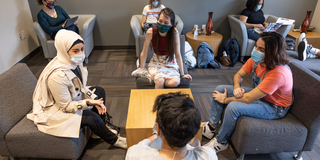
Counseling and Psychological Services (CAPS)
Counseling and Psychological Services offers a range of therapeutic interventions and outreach programs to support the mental health and well-being of students. CAPS promotes a supportive and inclusive environment where students can receive confidential counseling and guidance to navigate life’s challenges and to grow as individuals. Framed by nine Dimensions of Well-being, our services are grounded in principles of dignity, respect, and caring, and are aligned with the University's commitment to Cura Personalis, or care for the whole person.
HOURS
Monday through Friday, 8:30 a.m. - 4:30 p.m.
Swipe access to the office is only available during these posted hours.
Announcements
HOW TO GET TO CAPS
Effective Tuesday, December 9, a new gateway was opened at Sister Thea Bowman Hall at the corner of City and Cardinal Aves. Access to CAPS will be through this gateway, and the previous passageway through Sister Thea is closed due to construction. If you have questions about how to get to CAPS, please call us at 610-660-1090.
LIGHT BOX THERAPY AND THE WELLNEST
CAPS is excited to announce two brand new initiatives to help support the SJU student community!
We have opened a new space in the CAPS office called The WellNest, a reservable room designed to help you unwind, destress, or escape from a busy day. Come spend an hour in the WellNest to recover and recharge your batteries!
CAPS is now also offering Light Therapy boxes to students who may be experiencing dips in their energy and mood due to the changing of the seasons. Light Therapy boxes are free can be checked out by students for short-term rentals (subject to availability). To learn more, visit the Light Box Therapy page.
LANCASTER STUDENTS
The services listed on these pages are for Philadelphia-area students. For information about services for Lancaster students, please visit our SJU-Lancaster page.
Mental Health Emergencies
In the event of a personal emergency during normal working hours, students can call 610-660-1090 or come in person to Sister Thea Bowman Hall, Suite 200.
After office hours, on weekends and holidays, students may access support for emergencies by calling 911, SJU Public Safety (610-660-1111), or accessing after hours counselors (610-660-1090, option 2). Lancaster students may contact Public Safety for an emergency by dialing 6333 from an internal phone, or 717-735-1449 from an outside line. Lancaster Public Safety may be reached for non-emergencies at 717-947-6009.
When helping someone in crisis, it is important to remember to:
- clarify the problem
- communicate your commitment to help
- contact appropriate professional staff
- talk in a calm, direct and reassuring manner
- stay until assistance arrives
The following resources are additional sources of help:
| Fire or Medical Emergencies | 911 |
| Philadelphia Mental Health Crisis Line | 215-685-6440 |
| Suicide Prevention Lifeline | 988 |
| Crisis Text Line | Text START to 741-741 |
| SJU Rape Education Prevention Program (REPP) | 610-733-9650 (24hr helpline) |
| Addiction Hotline | 844-222-0553 |
| AIDS Hotline | 800-342-2437 |
| Philadelphia Center Against Sexual Violence | 215-985-3333 |
| Domestic Violence Hotline | 866-723-3014 |
| Lancaster County Crisis Intervention | 717-394-2631 |
| YWCA Lancaster's Sexual Assault Prevention and Counseling Center (SAPCC) | 717-392-7273 |
Appointments and Eligibility
Mental Health Resources
The QPR (Question, Persuade, and Refer) Gatekeeper training program teaches participants to effectively recognize and respond to emotionally distressed individuals who may be at risk for suicide.
CCAPS-Screen Mental Health Screenings
Brief, online, anonymous screenings for a wide range of mental health and substance use issues.
Saint Joseph's University is an alumni member of the JED Campus Program. It is designed to help colleges and universities enhance emotional well-being and mental health promotion efforts, reduce substance abuse and prevent suicide among their students.
Diversity, Equity, and Inclusion Statement
Saint Joseph's University’s CAPS strives to affirm, value, and celebrate diversity in all of its forms while integrating a perspective of cultural humility. Aligned with the goals of the University, we acknowledge the dignity of the individual and are committed to increasing and promoting awareness of and sensitivity to human differences. We view this commitment as an ongoing process and actively seek opportunities to learn about other cultures, identities, and beliefs in an effort to provide support to the entire Saint Joseph’s community and respect all of its members. Prejudice and discrimination in the areas of race, ethnicity, gender and gender identity, sexual orientation, religious/spiritual beliefs, disability, age, socio-economic status or class, body size/physical appearance, and marital status are detrimental to the populations we serve as well as to our own personal and professional development. Therefore, we resolve to work toward the recognition and elimination of such prejudice and discrimination and strive to build an open and trusting environment in which to foster interaction and understanding between ourselves, as well as among all groups in the greater University, local, national, and global communities.
Confidentiality Statement
So that students can talk freely and openly with a CAPS therapist about their concerns, we maintain strict professional standards of confidentiality and privacy under the laws of the Commonwealth of the Pennsylvania and ethical guidelines set forth by the American Psychological Association. Confidentiality may not apply if a person is deemed to be in imminent danger to self or others, in cases where the counselor has reason to suspect a child under 18 is being or has been abused, or by order in a court proceeding. To ensure the highest quality of care, CAPS therapists may consult with one another on cases. Every effort is made to safeguard the privacy of the client during these consultations.




